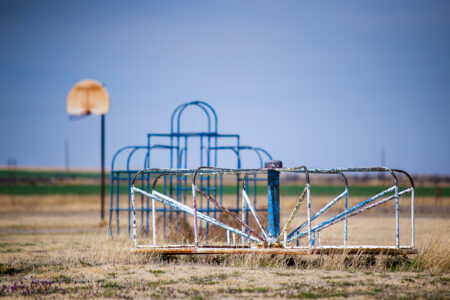Share On Social!
Estrella Hernandez grew up in San Antonio, a predominantly Hispanic (63.2%) city with a 28.5% rate of obesity in its population of over 1.3 million people. When she was in middle school she began to take a look around her city and found that there was a big problem with obesity and overweight, especially with kids her age. She knew that there had to be a way to get her classmates and peers to become healthier, while still having fun. Estrella came up with the idea of an interactive mobile app she titled WeWalk, which combined active living, healthy eating, and gaming. As she worked with members of the San Antonio community she began to discover that together as a city they could change the obesity epidemic while having fun through exercise.
EMERGENCE
Awareness: Sitting in health class at Alamo Heights Junior School in San Antonio, Texas, teenager Estrella Hernandez watched the obesity documentary Super Size Me.
She said the film gave her a sense of “helplessness, terror, and dread” as she learned that “many of my classmates and I most likely wouldn’t live longer than our parents” because of obesity, according to what she told the Rivard Report.
She was taught about the importance of healthy eating and staying active, but was “scared” that her peers and her community might not be heeding those lessons.
The feeling stuck with her for several days.
She had a revelation one afternoon as she played a computer game at home: combine technology and fitness to fight obesity, especially among youth who frequently play games on their computers and phones.
“San Antonio is an awesome city and it’s a city on the rise. There is a ton of awesome things and fun stuff happening here. But we have a problem; obesity is a big issue and it is starting to cause a lot of other problems,” Estrella said. “About two-thirds of adults and one-third of kids are overweight or obese. And while there are lot of things that can cause this issue, there are two things at the very root: poor eating habits and a lack of physical activity.”
Learn:Estrella started researching her idea on the Internet and didn’t find many fitness programs for kids.
Estrella’s father, Marcos Hernandez, and her mother encouraged her to move ahead. She began to brainstorm ways to make her idea into a reality.
Because of her interest in changing the obesity issue in San Antonio, Estrella became a Mayor’s Fitness Council (MFC) Student Ambassador.
MFC Student Ambassadors are youth ages 10-18 who want to make a difference in their schools and communities regarding obesity and health. They are educated on nutrition, fitness, and making healthy choices. Each ambassador creates a project within their school or community that will impact one of these areas, giving their peers ways to become healthier and lessen obesity among youth.
Estrella knew this was her opportunity to make a big difference in San Antonio.
Frame Issue: For her MFC Student Ambassador project, Estrella wanted to create a mobile application game (app) that would encourage youth to make healthy choices about nutrition and fitness.
Estrella wanted the app to focus strongly on getting her peers to walk more. Her mother suggested adding “we” to the word “walk” because it would give a sense of community.
Hence, the idea for the WeWalk app was born.
DEVELOPMENT
Education: Marcos worked with Geekdom, which provides workspaces for start-up companies to build their businesses and collaborate with other small companies, in his job as integration director at FPO Marketing.
Nick Longo, the co-founder and mentor-in-chief of Geekdom, heard about Estrella’s idea.
Longo invited Estrella to give a presentation about her WeWalk project idea and goals to a group of Geekdom partners and companies. This would be her first presentation of many to community members about how she wanted to reduce obesity and obesity related health issues among her peers.
Mobilization: Estrella received a lot of positive feedback and recommendations from many of the companies.
One company, the 80/20 Foundation, reached out to Estrella about how they could help with her app. The 80/20 Foundation hopes to turn San Antonio into the next hub for entrepreneurship by promoting technology education for the high-skill jobs of our knowledge economy, and providing more urban options.
They decided to fund Estrella to start building a phone app because “she has passion, deep conviction, and she is using her knowledge, skills, and talent to make San Antonio a better place to live, while showing everyone that regardless of how old you are you can tackle a big community challenge,” said Scott Meltzer, deputy director of the 80/20 Foundation.
Molly Cox of the City of San Antonio’s SA 2020 project, a nonprofit with a collective vision for improving the city by 2020, also wanted to support Estrella after hearing about her project.
Cox spoke with Estrella and Marcos on how they could work together, with SA2020 accepting grant money on their behalf and applying it to the app development.
They also helped Estrella seek more funding, which she got from H-E-B, a Texas-based supermarket chain.
“It’s fantastic that she’s created this app. And I think she’s thinking of it in an entrepreneurial way, like, ‘where can this go and how much bigger can this be?’” Cox said. “But there’s also this ultimate understanding that the foundation of what she is doing is because she just wants to make her city a better place.”
Debate: While generous, the amount of funding she received from 80/20 Foundation and H-E-B was only enough to develop a beta version of WeWalk, Marcos said. A beta version is a first draft of an app, with only a small sample of products that will be more developed in the final product.
Beta testing would try out the app among Estrella’s fellow youth.
ENACTMENT
Activation: To start development, Estrella and Marcos, connected with Sweb Development, a company that builds mobile apps, websites, and social media marketing campaigns in San Antonio.
Marcos knew Sweb founder and CEO Magaly Chocano, so he called her for advice.
Chocano lauded Estrella and the goal of the app.
“The truth is, as a woman of technology and as a Hispanic woman of technology, which are few and far between, I loved the fact that this girl came up with the idea,” Chocano said.
“And I knew that it was going to be hard for her to find a way to get it done. So with love and care we knew we could put a lot of work into the project, because we believed in her idea. I loved seeing her get excited, and once she has it in hand, it will give her more drive to move mountains.”
Sweb built the beta-test version of the WeWalk app, which involves programming code and designing the unique visuals, at a reduced rate to help Estrella achieve her goals.
Estrella then wanted to beta-test both the app and the prizes that would be awarded for using the app. So she reached out to a few local businesses such as a juice bar, a fruteria, and the city’s B-Cycle bike-sharing program.
They agreed to provide prizes for the app beta-testers who use gain the most points, and Estrella hope to continue these business relationships to provide healthy prizes like coupons when the app goes live.
Frame Policy: Estrella’s WeWalk app is expected to include:
- teaching nutrition with the “Yum Challenge,” a healthy eating trivia game that helped users determine the healthier option between two food or beverage choices;
- encouraging fitness through the walking or exercise “Quests”;
- promoting the community through the “Quests” by making the walking routes around landmarks or historical areas and including facts in the app about these places; and
- giving users incentives to stay active, eat healthy, and use her app by including prizes from local businesses.
Change: Estrella unveiled a beta version of the Sweb-developed WeWalk app in March 2014.
She beta-tested the app for the next two months among her fellow MFC Student Ambassadors, thanks to program coordinator Andrea Bottiglieri, and the local YMCA’s Síclovía play-in-the-street event on March 30, 2014.
She also has a website about her app.
And national attention is starting to generate, as she was recently interviewed by a Today Show crew, according to the Rivard Report.
IMPLEMENTATION
Implementation: Beta testing will include two main aspects of the final product; the Yum Challenge and fitness Quests.
While in beta-testing, the app is not available to download from the online app store. Instead beta testing participants are asked to give the WeWalk team a code from their phone, which will allow them to download the app onto their iPhone or iTouch with internet access.
The beta testing will include two main aspects of the final product; the Yum Challenge and fitness Quests.
Yum Challenge is a trivia game about the nutrition and health of common foods. Users will open the Yum Challenge and be given multiple choice questions. After choosing an answer, the correct answer will show on the screen to teach healthy options, and they will earn points for correct answers.
Quests take users on pre-routed walking or fitness paths around important places in the city, like the Mission San Jose, and the area surrounding the San Antonio Museum of Art downtown. While walking, users will get trivia about the culture and history of landmarks, and will be quizzed to gain points within the game.
The beta-testing period will gather technical information about usability, functionality and game performance.
Estrella will use the feedback from her peers to make changes according to what they like and didn’t like, and what they want to see more of.
Equity: She also wants to utilize the online community, through an Indiegogo campaign (an online platform where people can review creative project ideas and videos, then choose to donate any amount of money and get “perks” like T-shirts), to develop the full version of the WeWalk app.
This will help her app gain national reach.
She also hopes to be able to launch WeWalk as a download initially in the App Store for Apple products and soon after on Android products, too.
Estrella wants to offer the app for free and in English and Spanish, to reach diverse audiences.
“It could really, really change how kids view exercise,” says Chocano, “[The app] is taking something that kids are already on and making it fun for them to go outside.”
Sustainability: Estrella also hopes that the impending success of WeWalk will give her the opportunity to expand the app to other cities, planning their Quests, exploring their culture, improving their health, and reducing their risk for obesity and related chronic diseases.
“I was really struck by just how much of a lasting issue it was for some people, how it would cause things like diabetes which would haunt them for their entire lives.”
This entrepreneurship shows that anyone can make a difference if they are dedicated to a cause.
“What Estrella has done as a young woman is going to have a ripple effect out to San Antonio to future youth, showing them how they can take their interest and their passions and really make a difference in the lives of others,” said Meltzer of 80/20.
The WeWalk Website
By The Numbers
33
percent
of Latinos live within walking distance (<1 mile) of a park
This success story was produced by Salud America! with support from the Robert Wood Johnson Foundation.
The stories are intended for educational and informative purposes. References to specific policymakers, individuals, schools, policies, or companies have been included solely to advance these purposes and do not constitute an endorsement, sponsorship, or recommendation. Stories are based on and told by real community members and are the opinions and views of the individuals whose stories are told. Organization and activities described were not supported by Salud America! or the Robert Wood Johnson Foundation and do not necessarily represent the views of Salud America! or the Robert Wood Johnson Foundation.



